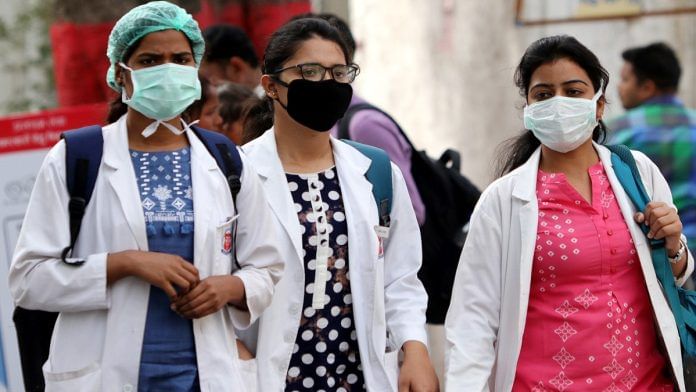New Delhi: The new Post-Graduate Medical Education Regulations (PGMER) state that medical institutions should allow resident doctors to work only for “reasonable” hours and rest for “reasonable time” in a day, without specifying what “reasonable” means.
The PGMER 2023 was notified by the National Medical Commission (NMC) on Monday and published Wednesday.
The new regulations, which have replaced the Postgraduate Medical Education (Amendment) Regulations, 2018, have for the first time also stipulated a leave policy for residents, which entitles them to 20 casual leaves, apart from five academic leaves every year.
The Federation of Resident Doctors Association (FORDA) — India largest network of resident doctors — expressed displeasure over the NMC’s failure to define working hours for PG doctors. It also criticised the leave policy, saying that the number of leaves mentioned in the regulations is less than what was sought. FORDA plans to appeal to the Union health ministry as well as the NMC to get the norms amended.
“For the last two years, we have been petitioning the government and the NMC to incorporate our demands related to working hours, leaves, stipend and working conditions. It is disappointing that very few of those have been incorporated in the new regulations despite assurances,” FORDA president Dr Aviral Mathur told ThePrint.
The association, in its representations to the ministry and NMC, has been demanding that resident doctors not be made to work beyond 60 hours a week and be given at least 30 leaves every year apart from fixed weekly offs.
They are currently given 20 leaves per year at most institutions. Resident doctors claim that on several occasions, they are made to work 24 hours and even 48 hours at a stretch, which leads to excessive work-related burnout. Moreover, in departments such as surgery, emergency, medicine and obstetrics and gynecology, which have the highest patient load in most government hospitals, the situation is particularly bad.
Doctors say that in many cases, hospitals deny weekly offs to residents while asking them to be on round-the-clock duty for up to five days a week.
FORDA has also expressed concern over the fact that its demand to make the proposed National Exit Test (NExT) — which will replace final year exams for MBBS students and entrance tests for post-graduate courses — only a licentiate examination and not a qualifying test, has been ignored.
“The new norms just mention NExT but don’t clarify what all purposes it will solve, leaving the provision vague and confusing,” Mathur said.
The regulations state that “an all-India merit list as well as a state-wise merit list of the eligible candidates shall be prepared based on the marks obtained in NExT or NEET (National Eligibility cum Entrance Test)-PG and candidates shall be admitted to post-graduate courses from the said merit lists only”.
ThePrint reached NMC spokesperson Dr Yogender Malik over phone. This report will be updated if and when a response is received.
Also Read: After pushback from South, NMC defers plan to add MBBS colleges & seats according to population
Disparity in stipends
A key demand of resident doctors that is not in the new regulations is uniformity in stipends. At present, states decide how much stipend is paid to residents. The latest norms too have left this to the states.
A senior resident associated with the government-run Stanley Medical College in Chennai said there was widespread disparity in stipends offered to residents across states.
“For example, the stipend offered in Tamil Nadu is Rs 40,000, in Delhi it is Rs 1 lakh and in Uttar Pradesh it is Rs 70,000. The residents want a ‘one nation, one stipend policy’ for PG doctors,” she said, not wanting to be named.
FORDA president Mathur, quoted earlier, said the association had requested the NMC to form a ‘National Body for Medical Examinations’, but that too has not been incorporated in the regulations. “As of now, there are multiple agencies responsible for conducting and managing entrance tests and counseling, which leads to confusion and chaos. We wanted the policymakers to address this issue but the new norms do not do that,” he added.
Moreover, the NMC has not made it mandatory for states to incentivise doctors doing their District Residency Programme (DRP) — another key demand. Doctors pursuing broad-speciality courses are required to undergo a compulsory residential rotation of three months in district hospitals as a part of their PG course curriculum.
(Edited by Gitanjali Das)
Also Read: ‘What’s the problem with Dhanvantari ji,’ asks NMC as doctors protest its new logo with Hindu deity



